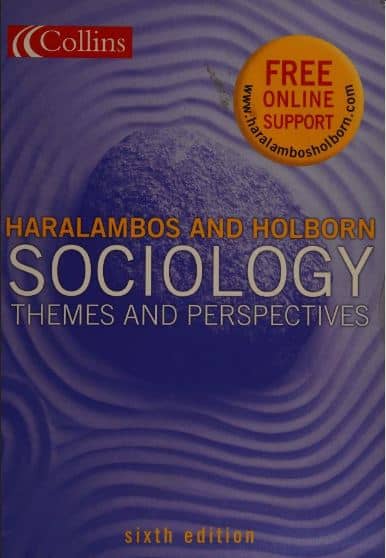‘Haralambos And Holborn Blue’ PDF Quick download link is given at the bottom of this article. You can see the PDF demo, size of the PDF, page numbers, and direct download Free PDF of ‘Haralambos And Holborn Blue’ using the download button.
Sociology Themes And Perspectives PDF Free Download

Haralambos And Holborn Blue
- Sociological perspectives
- Social stratification
- Sex and gender
- Race, ethnicity and nationality
- Poverty and social exclusion
- Crime and deviance
- Religion Families and households
- Power, politics and the state
- Work, unemployment, and leisure
- Education
- Culture and identity
- Communication and the media by Paul Trowler
- Methodology
- Sociological theory
‘Human beings learn their behaviour and use their intelligence whereas animals simply act on instinct. Like most commonsense notions, this idea has an element of truth, but the reality is far more complex.
The regimented society of social insects such as ants and bees is an object lesson in order and organization. Every member has clearly defined tasks in a cooperative enterprise.
Thus a beehive the worker bees, depending on their age, will either feed the young, stand guard and repel strangers, forage for food or ventilate the hive by beating their wings.
The behaviour of insects is largely ‘instinctive’, it is based on programmes contained in the genes which direct their actions. However, it would be a mistake to assume that the behaviour of insects is based solely on instinct. Experiments have indicated that at least some have the ability to learn.
Culture And Society
To all intents and purposes, a newborn human baby is helpless. Not only is it physically dependent on older members of the species but it also lacks the behaviour patterns necessary for living in human society.
It relies primarily on certain biological drives, such as hunger, and on the charity of its elders to satisfy those drives. The infant has a lot to learn. In order to survive, it must learn the skills, knowledge and accepted ways of behaving of the society into which it is born.
It must learn a way of life; in sociological terminology, it must learn the culture of its society.
Ralph Linton states that The culture of a society is the way of life of its members; the collection of ideas and habits which they learn, share and transmit from generation to generation.
We will now examine the points raised in this brief summary of Marxist theory in greater detail.
The major contradictions in society are between the forces and relations of production.
The forces of production include land, raw materials, tools and machinery, the technical and scientific knowledge used in production, the technical organization of the production process, and the labour power of the workers.
The ‘relations production’ are the social relationships which people enter into in order to produce goods.
Thus in feudal society they include the relationship between the lord and vassal, and the set of rights, duties and obliga- tions which make up that relationship.
In capitalist industrial society they include the relationship between employer and employee and the various rights of the two parties.
The relations of production also involve the relationship of social groups to the means and forces of production.
The means of production consist of those parts of the forces of production that can be legally owned. They therefore include land, raw materials,
machinery, buildings and tools, but not technical knowledge or the organization of the production process.
Under capitalism, labour power is not one of the means of production since the workers are free to sell their labour. In slave societies, though, labour power is one of the means of production since the workforce is actually owned by the social group in power.
In feudal society, land, the major means of production, is by the lord, whereas the serf has right to use land in return for services or payment to the lord.
In Western industrial society, the capitalists own the means of production, whereas the workers own only their labour, which they hire to the employer in return for wages.
Contradiction and change
Marx saw history as divided into a number of time periods or epochs, each being characterized by a particular mode of production.
Major changes in history are the result of new forces of production. Thus the change from feudal to capitalist society stemmed from the emergence, during the feudal epoch, of the forces of production of industrial society.
This resulted in a contradiction between the new forces of production and the old feudal relations of production.
Capitalist industrial society required relations of production based on wage labour rather than the traditional ties of lord and vassal.
When reach a certain point in their development, the new forces of production will lead to the creation of a new set of relations of production.
Then, a new epoch of will be born which will sweep away the social relationships of the old order.
| Author | Haralambos And Holborn |
| Language | English |
| No. of Pages | 538 |
| PDF Size | 36 MB |
| Category | Education |
Related PDFs
Sociology Haralambos And Holborn Blue Book PDF
